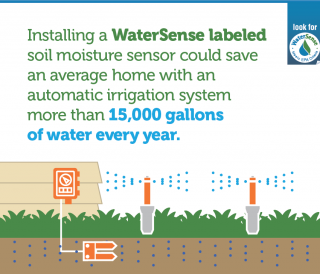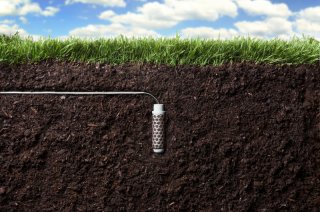Soil Moisture-Based Irrigation Controllers


WaterSense labeled irrigation controllers reduce water waste outdoors while keeping landscapes healthy. Soil moisture-based irrigation controllers, also known as soil moisture sensors (SMSs), are one option to help homeowners and businesses achieve water-efficient irrigation scheduling. By detecting the amount of moisture in the ground beneath the landscape, SMSs override scheduled irrigation when plants don’t need water, helping reduce water waste and promote plant health.
To find out more information about another option for efficient irrigation scheduling, review information on WaterSense labeled weather-based irrigation controllers.
On This Page:
Smart Watering
EPA estimates that more than 28 million homes across the United States have in-ground sprinkler systems that typically schedule watering with a clock-based controller. Irrigation schedules are often set to water at the height of the growing season, and the homeowner may not adjust the schedule to reflect seasonal changes or changes in plant watering needs. As an alternative to a clock-based controller, soil moisture-based irrigation controllers (or SMSs) effectively tailor irrigation schedules to meet landscape water needs based on direct measurements of moisture in the soil, which helps reduce water waste and promote plant health. SMSs can be stand-alone controllers or “add-on” or “plug-in” devices that can be used in conjunction with an existing clock-based controller to help it water more efficiently.
To earn the WaterSense label, SMSs must be able to consistently prevent or allow irrigation at a preset threshold. As with all other WaterSense labeled products, WaterSense labeled SMSs are independently certified to ensure that they meet the U.S. Environmental Protection Agency’s (EPA’s) criteria for efficiency and performance.
For more detailed information on WaterSense labeled SMSs, their benefits and function, read the WaterSense Labeled Soil Moisture–Based Irrigation Controller Mini Report (PDF) (4 pp, 643 K, About PDF).
Water Savings

Installing a WaterSense labeled SMS can save an average home with an automatic landscape irrigation system more than 15,000 gallons of water annually. Replacing clock-based controllers in all residential irrigation systems across the United States with WaterSense labeled SMSs could save more than 390 billion gallons of water each year. That’s equal to the annual household water needs of 5 million average American homes. Some utilities offer rebates to help you water smarter outdoors.
Performance
SMSs are designed to detect the amount of moisture in the ground beneath the landscape and override scheduled irrigation when plants do not need water, reducing water waste and promoting plant health. These control technologies must be able to consistently bypass irrigation at a predetermined setpoint (based on a reading from the SMS), allowing the landscape to be watered only when plants need it. WaterSense coordinated with stakeholders over many years, conducting product testing and test method validation, to develop the consensus-based test methods and criteria included in the ANSI/ASABE S633 standard, Testing Protocol for Landscape Irrigation Soil Moisture-Based Control Technologies. WaterSense’s specification subsequently incorporated this standard and criteria.
WaterSense labeled soil moisture-based controllers are independently certified to meet criteria related to the key performance attributes including:
- Function: Determines whether the SMS has the ability to enable or disable irrigation at a variety of moisture depletion levels.
- Precision: Measures whether the SMS can consistently enable or disable an irrigation event at a pre-set moisture threshold.
- Response to change in soil moisture: Determines whether the SMS can sense a change in soil moisture when moisture levels change.
- Function following freeze conditions: Evaluates whether the SMS functions after its sensor mechanism is frozen and thawed.
- Supplemental capability requirements: Ensures the presence of additional features (e.g., ability to accommodate watering restrictions) to ensure greater long-term water savings.
See the Performance Overview for more information on how WaterSense assessed performance when developing the specification.
- WaterSense Performance Overview: Ensuring Products Perform (pdf)
- WaterSense Performance Overview: Soil Moisture Sensor-based Irrigation Controllers (pdf)
Specification
EPA released a final specification for soil moisture-based irrigation controllers to earn the WaterSense label on February 11, 2021.
- WaterSense Specification for Soil Moisture-Based Irrigation Controllers (PDF) (9 pp, 195 K, About PDF)
- WaterSense Specification for Soil Moisture-Based Irrigation Controllers Supporting Statement (PDF) (19 pp, 407 K, About PDF)
- Supplemental Guidance for WaterSense Certification and Labeling of Weather-Based and Soil Moisture-Based Irrigation Controllers (PDF) (11 pp, 134 K, About PDF)
WaterSense held a webinar for soil moisture-based irrigation controller manufacturers to learn more about the specification, test method, and certification and labeling of these products on March 9, 2021. A copy of the presentation is available for those who were unable to attend.
Please note: WaterSense has prepared software that the licensed certifying bodies will use to administer the performance test protocol as described in the specification. Manufacturer partners may request a copy of the software by contacting the WaterSense Helpline at watersense@epa.gov or (866) WTR- SENSE (987-7367). The Helpline cannot provide technical support for the software. EPA only provides technical support for the software to its licensed certifying bodies as part of the certification process.
For more information about the soil moisture-based irrigation controller specification development process, including the draft specification, public response to the draft specification, and EPA's response to the public comments, please visit the Specification for Soil-Moisture Based Irrigation Controller Background Materials page.
Manufacturers that produce soil-moisture based irrigation controllers meeting EPA's efficiency and performance criteria can apply to have their products certified to earn the WaterSense label. Before submitting products for testing, manufacturers must have a signed WaterSense partnership agreement with EPA in place. Visit the manufacturer section on the partner page to learn more.

